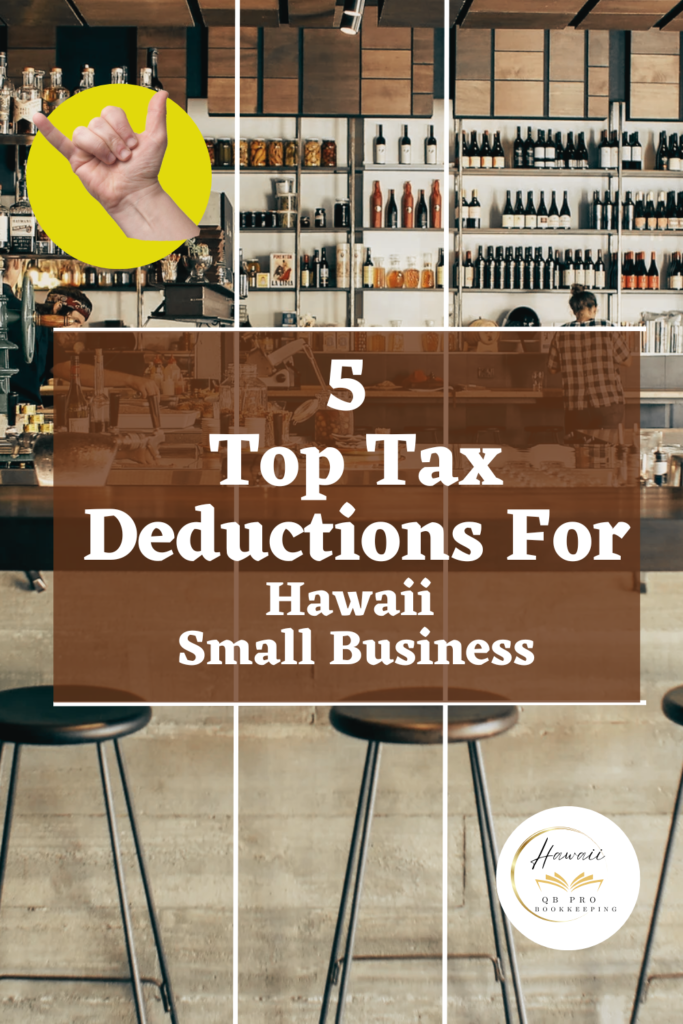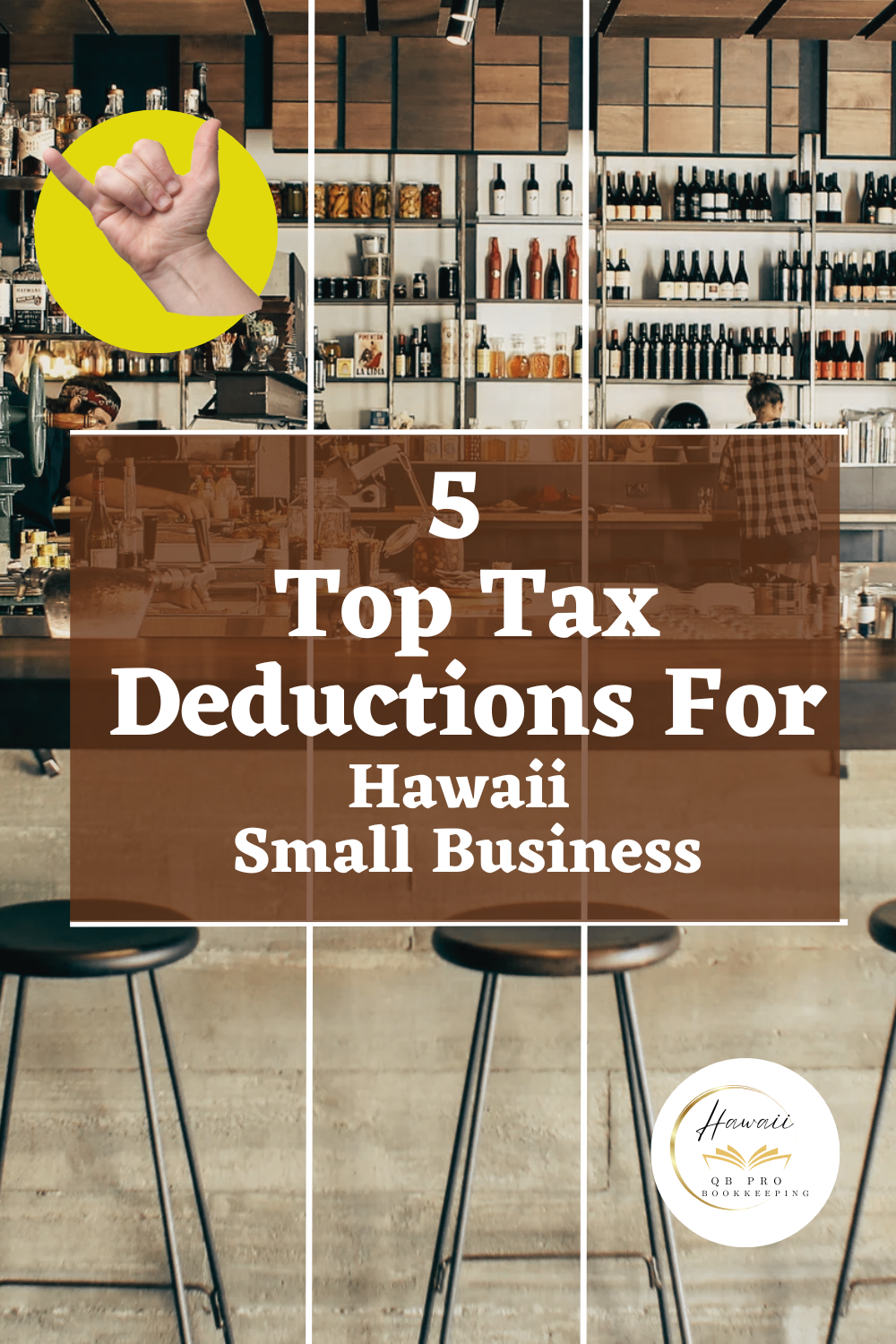Top 5 Tax Deductions for Small Business Owners in Hawaii

5 top tax deductions for Hawaii SMB
Introduction
Running a small business in Hawaii comes with its own set of financial perks—and challenges. While the stunning views and relaxed lifestyle may offer personal benefits, the business environment requires close attention to the state’s unique tax landscape. One of the most effective ways to ease your tax burden as a small business owner is by maximizing your deductions.
Tax deductions can lower your taxable income, meaning you keep more of your hard-earned money. But navigating these deductions, especially in a state like Hawaii where inter-island travel and high overhead costs are common, can get tricky. That’s why understanding which deductions apply specifically to you—and how to use them correctly—is absolutely essential.
Let’s break down the top 5 tax deductions every small business owner in Hawaii should know and leverage to the fullest.
1. Home Office Deduction
Operating a business from your home is more common than ever, especially with the rise of remote work. In Hawaii, where commercial real estate is notoriously expensive, many entrepreneurs and freelancers choose to work from home. The home office deduction can provide significant relief if you meet the IRS’s criteria.
Qualifying for the Home Office Deduction
To qualify, the space in your home must be used exclusively and regularly for your business. That means no working from the dining table if it doubles as a family dinner spot. Also, the space should be your principal place of business—you either perform most of your work there or meet clients and conduct business regularly in that space.
This can be a separate room, a finished basement, or even a section of a garage, as long as it’s not used for any personal activities.
How to Calculate the Deduction
There are two methods:
- Simplified Method: You deduct $5 per square foot, up to 300 square feet. Simple and quick—perfect if you’re short on time or hate math.
- Regular Method: More complex, but potentially offers a larger deduction. You calculate the percentage of your home’s square footage used for business and apply that to actual expenses like mortgage interest, rent, utilities, and repairs.
Let’s say your home office is 200 square feet in a 1,000-square-foot home. That’s 20%. If your utilities for the year were $2,400, you could deduct $480 just for utilities alone.
Common Mistakes to Avoid
One big mistake is claiming the deduction for shared spaces like your kitchen table or couch. Another is forgetting to adjust for part-time use—only claiming for months when the office was in use. Always keep detailed records and even take photos of your workspace for proof.
2. Business Use of Vehicle
If you use your car for business, even occasionally, you’re likely eligible for vehicle-related tax deductions. In Hawaii, where small businesses often span multiple islands or require driving for meetings and deliveries, this deduction can add up fast.
Deductible Vehicle Expenses
There are two main ways to calculate your deduction:
- Standard Mileage Rate: For 2025, it’s $0.67 per mile (subject to IRS updates). Just multiply your business miles by the rate. This method simplifies the process and includes maintenance, depreciation, gas, and insurance.
- Actual Expense Method: Tally up actual costs like fuel, maintenance, insurance, registration fees, lease payments, and depreciation. Multiply by the percentage of business use.
For example, if your total vehicle expenses are $6,000 and 60% of your driving is business-related, you can deduct $3,600.
Recordkeeping Requirements
Documentation is everything. Keep a mileage log noting the date, purpose, and miles driven. You can use apps like MileIQ or even a paper notebook. Also, store receipts for all vehicle-related expenses if using the actual expense method.
Leasing vs. Owning a Vehicle
Leasing may offer larger upfront deductions due to lease payments, while ownership provides depreciation benefits. Which is better? It depends on how long you plan to keep the vehicle and your business’s cash flow.
Still with me? These two deductions alone can knock thousands off your taxable income—but we’re just getting started.
3. Travel and Meals
Business travel and meals can be a goldmine for deductions—if you do it right. For Hawaii business owners, especially those with clients on different islands, this category can be particularly lucrative.
What Counts as Deductible Travel
To qualify, your trip must be primarily for business and involve an overnight stay. That means if you’re flying from Oahu to Maui for a two-day client meeting, those plane tickets, hotel stays, and cab rides are deductible.
However, if your trip is primarily for personal reasons and you just happen to do a bit of business while there, tough luck—it’s not deductible.
Meal Deductions and Limits
Meals while traveling for business are 50% deductible, but only if they aren’t lavish or extravagant and you’re eating with a business purpose in mind. This includes meals with clients, employees, or vendors.
To claim, you need:
- The amount spent
- Date and location
- Business purpose
- Who you dined with
Pro tip: Keep those receipts and jot down notes immediately. It’s easy to forget what a meal was for after a few weeks.
Hawaii-Specific Considerations
Inter-island travel can get expensive, but it’s often necessary. If your business regularly requires you to hop from island to island for meetings, events, or networking, all those airfare and lodging expenses add up. Just remember, you must prove the trip had a legitimate business purpose.
4. Employee Wages and Benefits
If you have employees, you know how much it costs to maintain a productive team. But the good news? Many of those costs are tax-deductible. Whether you’re paying full-time staff, part-timers, or seasonal workers, this deduction is one you definitely don’t want to overlook.
Wages, Salaries, and Bonuses
Paying employees? You can deduct their wages, salaries, commissions, and bonuses as a business expense. This includes both hourly and salaried employees, as long as they are classified properly and paid for legitimate work. You’ll also need to ensure you’re complying with federal and Hawaii state labor laws.
The key here is documentation. You must maintain accurate payroll records, including W-2 forms, timesheets, and payment receipts. Failing to pay the appropriate payroll taxes or classify workers correctly can not only disqualify deductions but also result in hefty penalties.
Retirement Plans and Benefits
Offering your team retirement benefits like a 401(k) or a SIMPLE IRA? Good news: employer contributions to employee retirement accounts are tax-deductible. You can also deduct employer-paid health insurance premiums, life insurance, and disability insurance.
Let’s not forget Hawaii’s Prepaid Health Care Act, which requires employers to provide health insurance to eligible employees. Those premiums, along with any contributions to employee Health Savings Accounts (HSAs), are deductible as business expenses.
This can make a big difference for small business owners trying to remain competitive in Hawaii’s tight labor market. Plus, offering benefits can reduce your turnover and increase employee satisfaction.
Independent Contractors vs. Employees
It’s critical to understand the difference between independent contractors (who receive 1099s) and employees (who receive W-2s). Misclassifying an employee as a contractor to avoid payroll taxes is a big no-no in the eyes of the IRS and the Hawaii Department of Labor.
While you can still deduct payments to contractors as business expenses, failure to classify workers correctly could lead to audits, back taxes, and fines.
5. Rent and Utilities
If you lease space for your business—or even rent shared office space—you’re eligible for some meaningful tax deductions. And in Hawaii, where commercial rents can be sky-high, this category could be one of your biggest deductions.
Office and Commercial Rent
Whether you rent a retail storefront, warehouse, office, or even a co-working desk, rent paid for business use is fully deductible. Just make sure the lease is in your business’s name and used strictly for business operations.
Also, don’t forget to include any property taxes, security deposits (if not returned), and maintenance fees that you pay as part of your rental agreement. These are often overlooked but still deductible if they directly relate to your business activities.
Renting can be more flexible and less risky than owning property, especially in places like Honolulu or Maui where real estate costs are high and unpredictable. But owning also comes with its own set of tax advantages—like depreciation, mortgage interest deductions, and property tax write-offs.
Utility Bills and Internet
All business-related utility bills are deductible, including:
- Electricity
- Water and sewage
- Gas
- Internet service
- Phone lines (landlines and mobile)
However, if you work from home and share utilities, you’ll need to allocate the percentage that applies to your business use. For example, if you work out of a home office that takes up 20% of your home’s square footage, you can deduct 20% of your utility costs.
For mobile phones, only the portion used for business qualifies. That’s why keeping a separate business line or using detailed billing to split business vs. personal usage is a smart move.
Shared Spaces and Co-working Offices
With the rise of digital nomads and small startups in Hawaii, co-working spaces have become more common. If you rent a spot at a co-working hub in Honolulu or Hilo, that rent, as well as any additional services you pay for (conference rooms, printing, Wi-Fi, etc.), are all deductible.
Just make sure to keep receipts and track your expenses monthly. Many co-working spaces issue regular invoices—these are perfect for your records and easy to categorize during tax time.
Conclusion
Tax season can feel overwhelming, especially for small business owners in Hawaii who already juggle countless responsibilities. But here’s the truth: maximizing your tax deductions isn’t just for large corporations with fancy accountants—it’s essential for small businesses too. When you know which expenses to track, how to categorize them, and what records to keep, you can legally reduce your tax burden and keep more of your earnings.
From setting up a proper home office and documenting every business mile to providing employee benefits and carefully managing inter-island travel, each deduction we’ve discussed can significantly impact your bottom line. Hawaii may have its own set of unique challenges—like high overhead costs and geographic isolation—but those same challenges can translate into higher deductions if handled correctly.
Remember, the key to successfully claiming deductions is detailed recordkeeping, accurate classifications, and when in doubt, consulting a professional tax advisor. The IRS isn’t out to get you, but they do expect you to play by the rules. The more organized and informed you are, the smoother your tax season will be.
By understanding these top five deductions—home office, vehicle use, travel and meals, employee wages, and rent/utilities—you’re not just saving money; you’re also building a more sustainable and profitable business. That’s something every Hawaii entrepreneur can get behind.
FAQs
1. Can I deduct both home office expenses and office rent at the same time?
Typically, no. If you rent an outside office space and use that as your principal place of business, you can’t also claim a home office deduction. However, if you use your home office for administrative work and rent another location for meetings or storage, it may be possible. Keep documentation and consult a tax advisor.
2. How often should I update my mileage log for vehicle deductions?
You should update it daily or weekly to ensure accuracy. Many people forget to log miles until it’s too late. Consider using apps like MileIQ or Everlance to automate this process and make your life easier come tax time.
3. Are all inter-island business travels deductible in Hawaii?
Only if the primary purpose of the travel is business-related. That means if you’re flying from Oahu to Big Island for a client meeting or business seminar, you’re good. If you’re combining a family vacation with a brief business activity, you’ll need to separate and only deduct the business portion of your expenses.
4. What happens if I misclassify an employee as an independent contractor?
The IRS takes this very seriously. Misclassification can lead to back taxes, interest, and penalties. In Hawaii, both the IRS and state labor departments may audit your business. Always review the criteria for classification or consult a payroll specialist.
5. Can I deduct my mobile phone bill if I use it for business and personal calls?
Yes, but only the portion used for business is deductible. The best way to handle this is to keep a separate business phone or line. If you use a single phone, maintain detailed billing records and highlight which calls were business-related.







